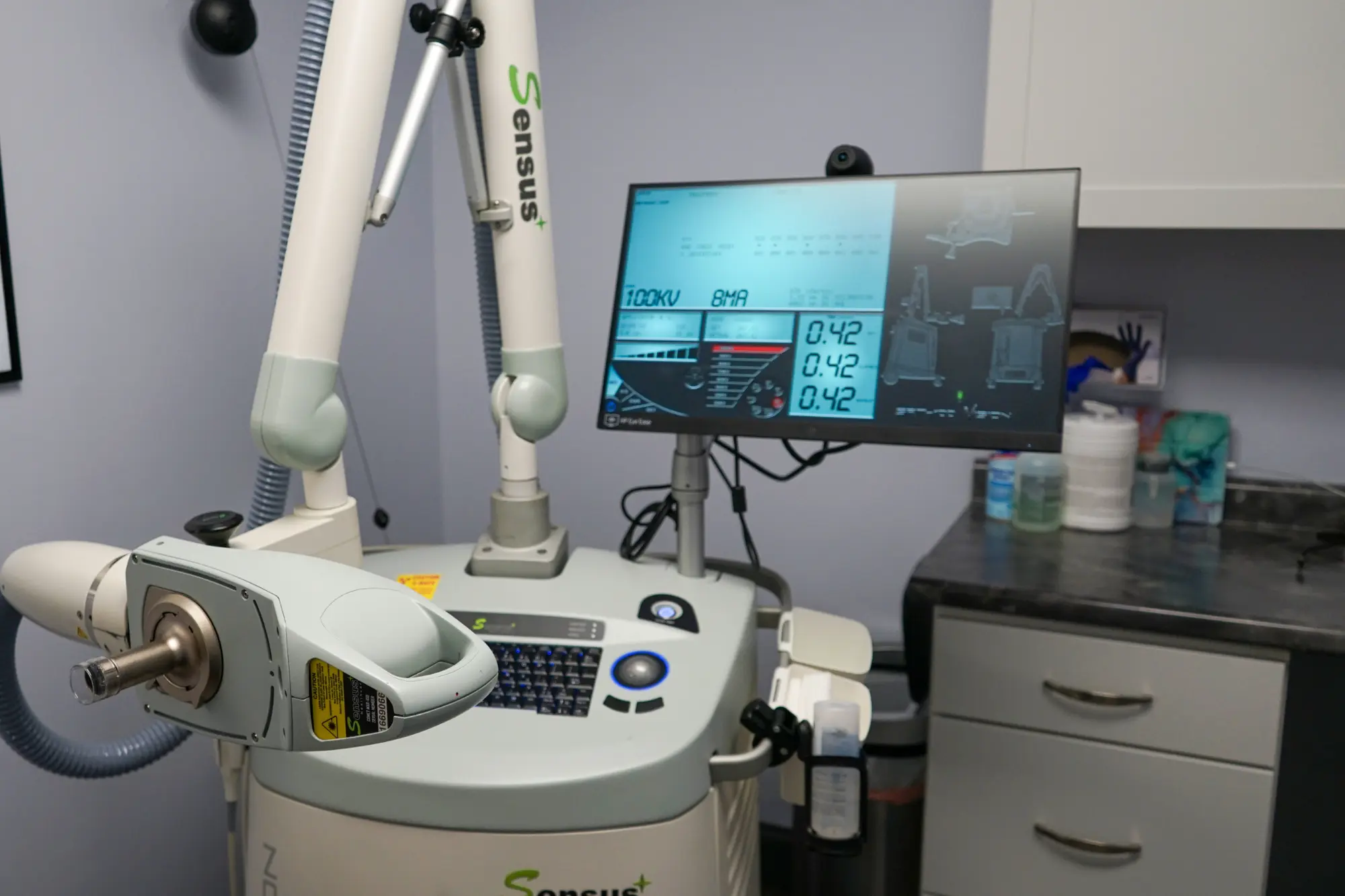
Compare IG-SRT vs. Mohs Surgery
- Home
- Compare IG-SRT vs. Mohs Surgery
IG-SRT vs. Mohs Surgery: Understanding Your Options for Skin Cancer Treatment
Many patients are relieved to learn that not all skin cancers require surgery. Image-Guided Superficial Radiation Therapy (IG-SRT) provides a non-invasive, highly targeted alternative for many early-stage basal cell and squamous cell carcinomas — no cutting, no stitches, and no surgical wound to heal.
Mohs surgery remains a strong choice for certain aggressive, deeply rooted, or recurrent cancers, but it is not the only effective option. For many patients, the choice comes down to comfort, cosmetics, lifestyle, and medical suitability. This page gives a clear, honest comparison so you can choose the treatment that best fits your diagnosis and your life.
What Is IG-SRT?
Image-Guided Superficial Radiation Therapy uses high-frequency ultrasound imaging to map the exact size, shape, and depth of the skin cancer. Then, low-energy, surface-focused radiation precisely targets only the cancerous tissue.
Why Patients Choose IG-SRT
- No pain, no needles, no cutting, no stitches
- No surgical wound and no bandages
- Minimal downtime — resume normal activity right away
- High cure rates for early basal cell and squamous cell carcinoma
- Strong cosmetic outcomes without scarring
- Ideal for visible areas (face, nose, ears, scalp, hands)
- Safe for patients who prefer to avoid surgery or are not good surgical candidates
Learn More About IG-SRT
To learn more about how IG-SRT works, including mapping, targeting, comfort, and treatment expectations, visit our Image-Guided Superficial Radiation Therapy (IG-SRT) page.
What Is Mohs Surgery?
Mohs surgery is a surgical procedure that removes thin layers of skin using a scalpel. Each layer is examined under a microscope until all cancer cells are cleared.
Key Points About Mohs
- Requires surgical excision with a scalpel
- Performed under local anesthesia with needles
- Creates a wound that may require stitches, wound care, or reconstructive repair
- Healing time can vary based on wound size and location
- Effective for aggressive, deeply invasive, or recurrent cancers
- Often performed on high-risk or large tumors
Mohs surgery is an excellent choice for complex cancers — but it is still surgery. For many patients, surgery is not appealing or medically ideal.
IG-SRT vs. Mohs: How to Choose
Selecting the right treatment depends on several factors.
IG-SRT is often preferred when:
- The cancer is an early-stage basal cell or squamous cell
- Cosmetic outcome is a priority
- The patient wants to avoid cutting, stitches, or wounds
- The cancer is on the face, nose, ears, scalp, or hands
- The patient wants minimal downtime
- The patient is not a good surgical candidate
Mohs surgery may be recommended when:
- The tumor is large, aggressive, or invasive
- The cancer has recurred after prior treatment
- Margin analysis needs to be immediate
- The cancer falls into a high-risk category
At Biltmore Dermatology, recommendations are never scripted. Your provider evaluates:
- Cancer type
- Tumor size and depth
- Location
- Risk level
- Your health and personal preferences
You receive clear options, not pressure.
Why So Many Patients Choose IG-SRT
For patients who qualify, IG-SRT offers a treatment path that avoids:
- Zero cutting
- Zero surgical wounds
- Zero wound care or bandages
- Zero needles
- Zero stitches
- Zero anesthesia injections
- Zero lifestyle disruption
It treats the cancer effectively while protecting comfort, appearance, and daily life.
IG-SRT is Painless, Proven, and Precise
Painless
Superficial radiation stays in the upper skin layers and does not reach pain-sensing nerves.
Proven
FDA-cleared technology with decades of safe dermatologic use.
Precise
High-frequency ultrasound maps the tumor so radiation targets only the cancer.
IG-SRT vs. Mohs — Mini FAQ
Find the Right Treatment for You
If you’ve been diagnosed with skin cancer or have a concerning spot, we will
walk you through your options clearly and at your pace.
No pressure.
No assumptions.
Just expertise, guidance, and treatments designed for your comfort and long-term
skin health.
Contact Biltmore Dermatology to schedule your evaluation.